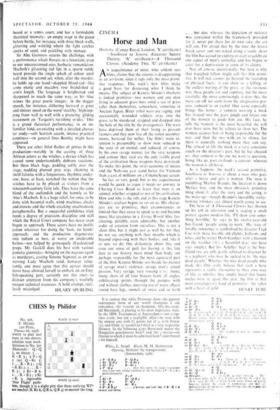CINEMA
-”• Horse and Man.
Onibaba. (Cameo Royal, London, 'X' certificate.) —Southwest to Sonora. (Leicester Square Theatre, 'A' certificate.)—A Thousand
Clowns. (Academy Two, certificate.)
A N acquaintance of mine, who seldom sees
A
films, claims that the cinema is disappointing as an art-form, since it taps only the most primi- tive responses. This week's new films make a good basis for discussing what I think he means..The subject of Kaneto Shindo's Onibaba is indeed primitive—two women and one man living in adjacent grass huts amid a sea of grass taller than themselves, somewhere, sometime in Ancient Japan. Bitter tribal wars are raging, and occasionally wounded soldiers stray into the grass, to be murdered stripped and dropped into the hole of the title by the protagonists. The wars ',have deprived them of their living as peasant farmers and they now live off the stolen accoutre- ments, bartered for millet. The film's main in- tention is presumably to show man reduced to the state of an animal, and reduced, of course, by his own savage nature; for the very weapons and armour they steal are the only visible proof of the civilisation those weapons have destroyed. To make this point, the strict economy of means and the Noh-size cast stand better for Vietnam than a cast of millions on a CinemaScope screen.
So far, so very good, but as my acquaintance would be quick to argue it needs no journey to Charing Cross Road to learn that man is an animal, whether stripped or not of his civilisation. How and why is the rub, and at this stage Kaneto Shindo's artefact begins to rat on us. His charac- ters are so primitive, their circumstances so limited that they cease to speak to us and become more like creatures in a Living World film, fas- cinating, pitiable, even admirable, but another order of creation from ourselves. This is not a silent film, but it might just as well be. for they do not say anything with their mouths which is ,beyond expressing with their bodies; and. like it or not, we do. Our dishonesty about this, and even our sense of guilt for having at this late date in our history more mind than body, are perhaps responsible for the most equivocal part of the film. Kaneto Shindo sets beside his picture of savage man's violence, savage man's sexual passion. Very savage, very rousing it is: many, many shots of all four breasts from all angles, exhilarating sprints through the pampas with and without clothes, unerring use of water effects round bare legs, runnels of sweat and so forth
. , . but alas, whereas the depiction of violence was contained within the framework provided for it, never put there for its own sake, the sex will out. I'm afraid that by the time the lovers break cover and run naked along a sandy shore the film has ceased to explore or even to celebrate one aspect of man's animality and has begun to cater for a deprivation in some of its clients.
Not, of course, intentionally; but here is why that Wretched fellow might call this film primi- tive. It will not, cannot go beyond the recording of ph■sical facts: it can show us a killing, or the endless waving of the grass. or the ravenous way these people eat and copulate. but the more carefully. the more convincingly it does this, the more cut off we seem from the imaginative pro- cess. reduced to an eyeful. One scene especially brings this home: a samurai wearing a mask has strayed into the grass jungle and forces one of the women to guide him out. His face, he tells the woman, is the most beautiful she will ever have seen. but he refuses to show her. The woman accuses him of being responsible for the war, and then the two walk on in silence, for there is naturally nothing more they can say. The refusal to lift the mask is a very conscious touch on the director's part, but he has cheated us: that samurai is the one we want to question, being, like us. part civilised—a centaur; whereas the woman is all horse.
As it happens, the week's second primitive, Southwest to Sonora. is about a man who goes after a horse and gets a woman. The man is mumbling Marlon Brandt), the location is down Mexico way, and the most obviously primitive thing about. it. after the story and the acting, is the make-up—though Brando's incredibly sticky- looking whiskers are almost worth going to see.
The hero of A Thousand Clowns has thrown up his job in television and is staging a small protest against modern life. 'I'll show you some- thing horrible,' he Nays to his twelve-year-old boy-friend, 'people going to work.' His state of lovable innocence is symbolised by director Fred Coe with those lovable old clichés, balloons and kites, and by writer Herb Gardner with a fixation on the weather ('it's a beautiful day,' our hero says simply). But his Achilles' heel is the boy- friend (we arc only partly relieved to discover he is a nephew). who may be sucked in by 'the nice dead people.' Whether the nice dead people who made this film really believe that such a hero represents a viable alternative to their own way of life, or whether they simply heard that funny uncles were in again this year. the film is that most contemporm■ kind of primitive-- the robot






































 Previous page
Previous page